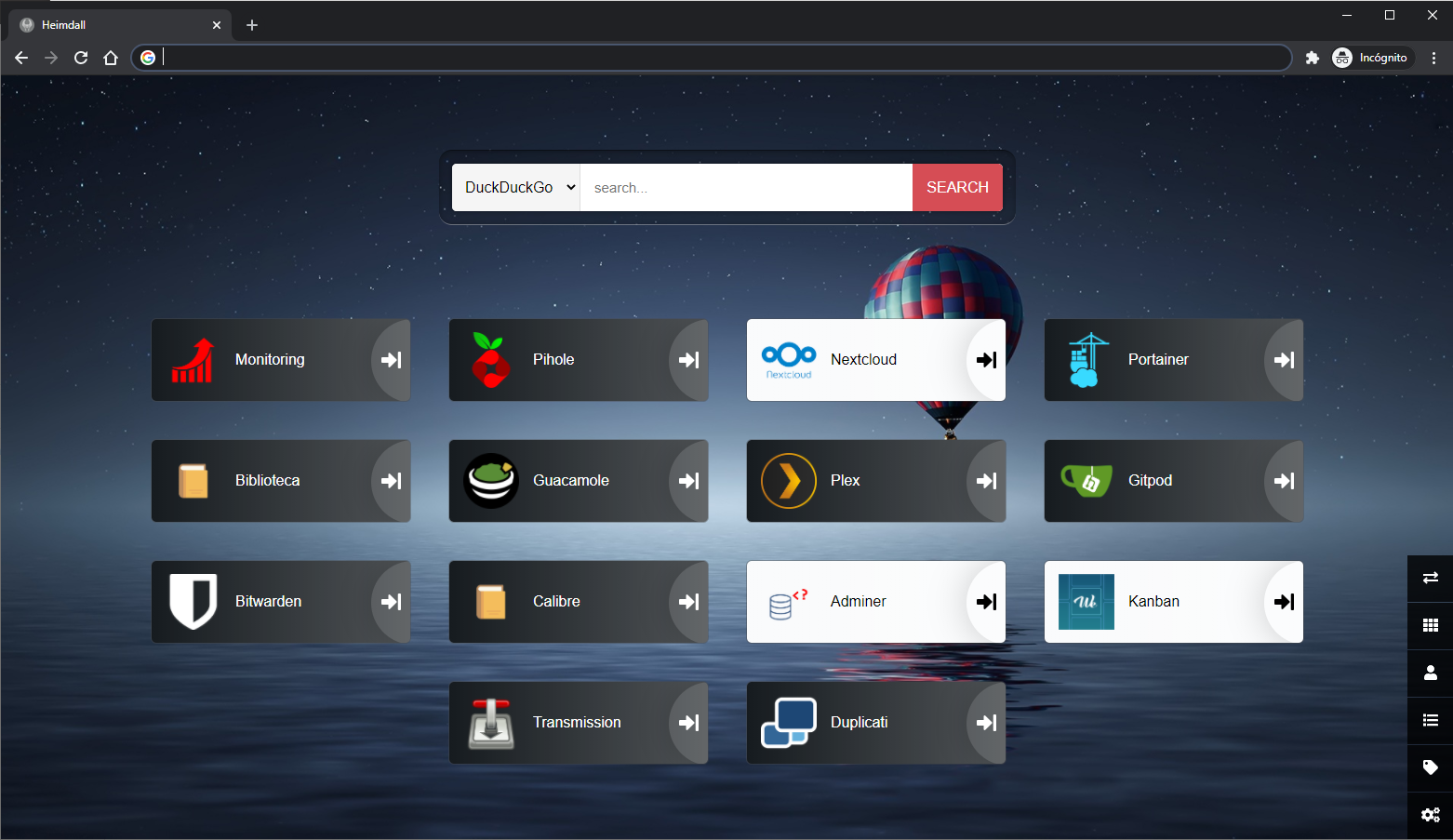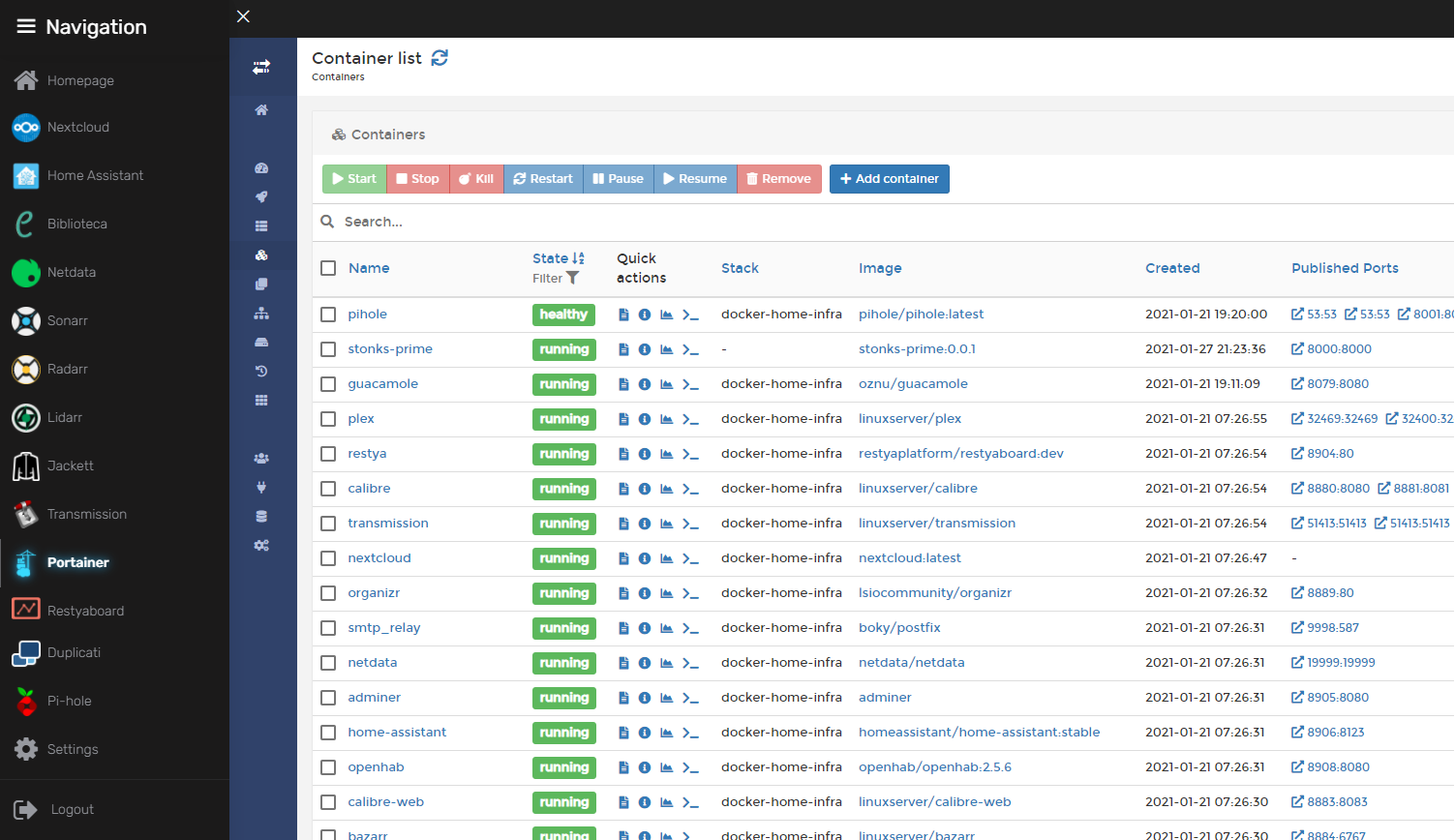This repo consists mainly in a docker-composed file ready to spin up a bunch of useful media, file-sharing, programming, web tools, databases... All the persistent data is stored in the ./config folder and Duplicati is provided in order to backup all data.
- Traefik: Reverse proxy to be in front of all web services
- Nextcloud: Nextcloud is the most deployed on-premises file share and collaboration platform.
- MariaDB: Database required by nextcloud
- Organizr: Organizr allows you to setup "Tabs" that will be loaded all in one webpage.
- Pi-hole: The Pi-hole® is a DNS sinkhole that protects your devices from unwanted content, without installing any client-side software.
- Heimdall: Heimdall Application Dashboard is a dashboard for all your web applications.
- Calibre: calibre is a powerful and easy to use e-book manager
- Calibre-web: Calibre-Web is a web app providing a clean interface for browsing, reading and downloading eBooks using an existing Calibre database.
- Portainer: allows you to easily build, manage and maintain Docker environments.
- Netdata: Instantly diagnose slowdowns and anomalies in your infrastructure with thousands of metrics, interactive visualizations, and insightful health alarms.
- Guacamole: clientless, web-based remote desktop gateway. It supports standard protocols like VNC, RDP, and SSH.
- Transmission: BitTorrent client.
- Restyaboard: Kanban board, management tool.
- Duplicati: Backup tool
- Postgresql: Database needed for Restyaboard
- Adminer: Database management tool.
- Bazarr, Sonarr, Radarr, Lidarr: download managers
- Jackett: indexer scrapping
- Plex: Media file organizer and streamer.
- Watchtower: A process for automating Docker container base image updates.
- Duplicati: Free backup software to store encrypted backups online. Configured to backup the persistent data of the other containers.
- sftp: FTP server
- Postfix: Mail sender
- HomeAssistant: Open source home automation that puts local control and privacy first. Powered by a worldwide community of tinkerers and DIY enthusiasts.
- OpenHab: a vendor and technology agnostic open source automation software for your home.
- Some domain
- Docker installed
- Docker-compose installed
- Create docker network
docker network create nextcloud_network
- Setup the credentials and storage path in .env file
- Launch docker compose setup
docker-compose up -d
-
First, disable and stop Ubuntu's DNS resolver using the following two commands, otherwise pi-hole can't start because port 53 will be in use:
sudo systemctl disable systemd-resolved.service sudo systemctl stop systemd-resolved.service
Open network manager configuration using the following command for editing:
sudo nano /etc/NetworkManager/NetworkManager.conf
Add dns=default under [main] so that the file contents look like what is shown below:
[main] plugins=ifupdown,keyfile dns=defaultThen, remove or even better rename /etc/resolv.conf file (it is a symbolic link) using the the following command:
sudo mv /etc/resolv.conf /etc/resolv.conf.bak restart your network manager using the following command. sudo service network-manager restart
-
Set your domain as trusted domain on Nextcloud config If you try to access your nextcloud instance right now, you will receive a message telling that this is not a trusted domain. To fix this you should setup your domain in two parameters of the file "app/config/config.php": first one under 'trusted_domains' => and the other one at 'overwrite.cli.url'
Setting up External Storage
'check_data_directory_permissions' => false,Needed to go through the reverse proxy:
‘overwriteprotocol’ => ‘https’, -
IMPORTANT: Remember to setup passwords at first deployment to sonarr, radarr and lidarr, otherwise they will be exposed to the internet without password.

